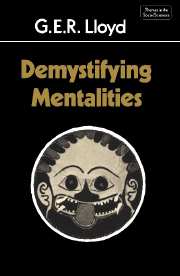Book contents
- Frontmatter
- Contents
- Note on texts and references
- Acknowledgements
- Introduction
- 1 Mentalities, metaphors and the foundations of science
- 2 Magic and science, ancient and modern
- 3 The conception and practice of proof
- 4 A test case: China and Greece, comparisons and contrasts
- Conclusion: mentalities demystified
- Notes
- Bibliography
- Index
2 - Magic and science, ancient and modern
Published online by Cambridge University Press: 07 January 2010
- Frontmatter
- Contents
- Note on texts and references
- Acknowledgements
- Introduction
- 1 Mentalities, metaphors and the foundations of science
- 2 Magic and science, ancient and modern
- 3 The conception and practice of proof
- 4 A test case: China and Greece, comparisons and contrasts
- Conclusion: mentalities demystified
- Notes
- Bibliography
- Index
Summary
If one of the original motivations for invoking the idea of differences in mentalities was somehow to account for what seemed highly counter-intuitive or paradoxical statements of the kind we have discussed in chapter 1, another was certainly provided by the problems in understanding magical practices and beliefs, often associated with ‘mystical’ or ‘mythical’ patterns of thought and so with the corresponding postulated mentality. Indeed some time before Lévy-Bruhl a certain preoccupation with the problem of magic is a recurrent feature in writers of different types. In some cases the strategic interest motivating the introduction of the topic is clear. Nineteenth-century evolutionists of different philosophical persuasions often invoked magic in developing the theme of the primitivism of archaic times. That theme, variously interpreted, was one shared by philosophers as otherwise divergent as Comte and Hegel. However it was Frazer who was responsible for a particularly clear and influential statement of the view according to which the three states through which human societies have developed are marked by magic, religion and science respectively (Frazer 1911–15).
Some of the reasons for the popularity of the Golden Bough have been analysed by Edmund Leach (1961, 1965, cf. Ackerman 1987). As a literary artefact it is highly polished, making liberal use of evocative epithets that reveal both a certain condescension and a certain romanticism. Frazer introduced his readers, at a safe distance, to the ‘wild man in the woods’, the ‘poor savage’ with his ‘vain fancies’.
- Type
- Chapter
- Information
- Demystifying Mentalities , pp. 39 - 72Publisher: Cambridge University PressPrint publication year: 1990

